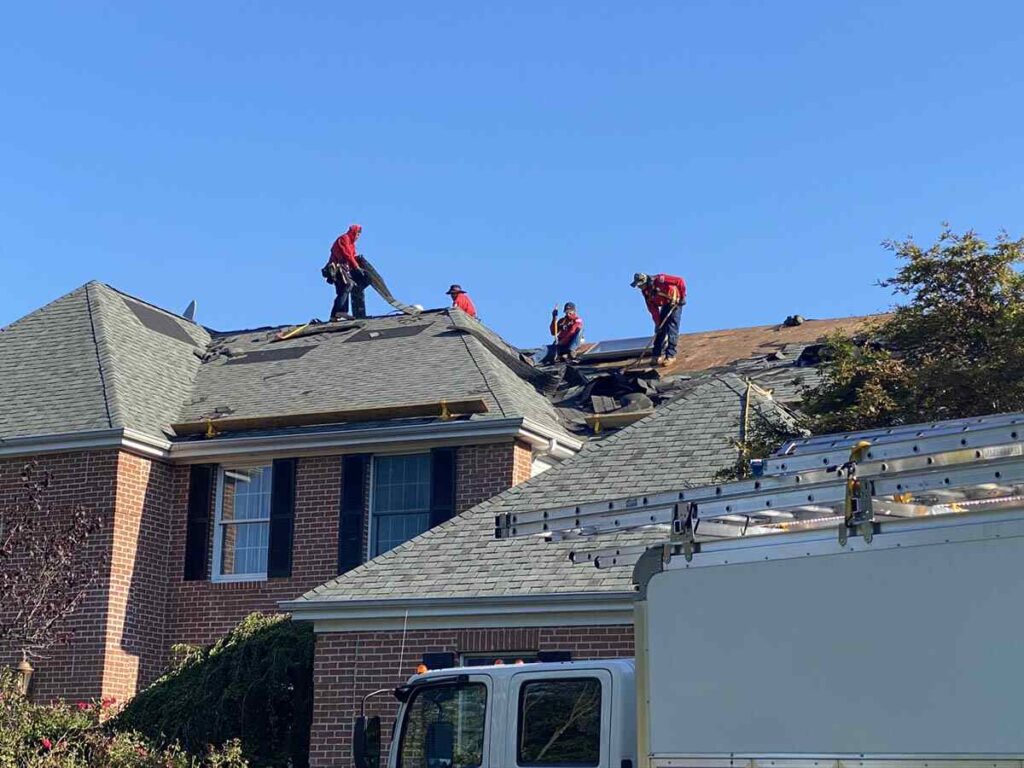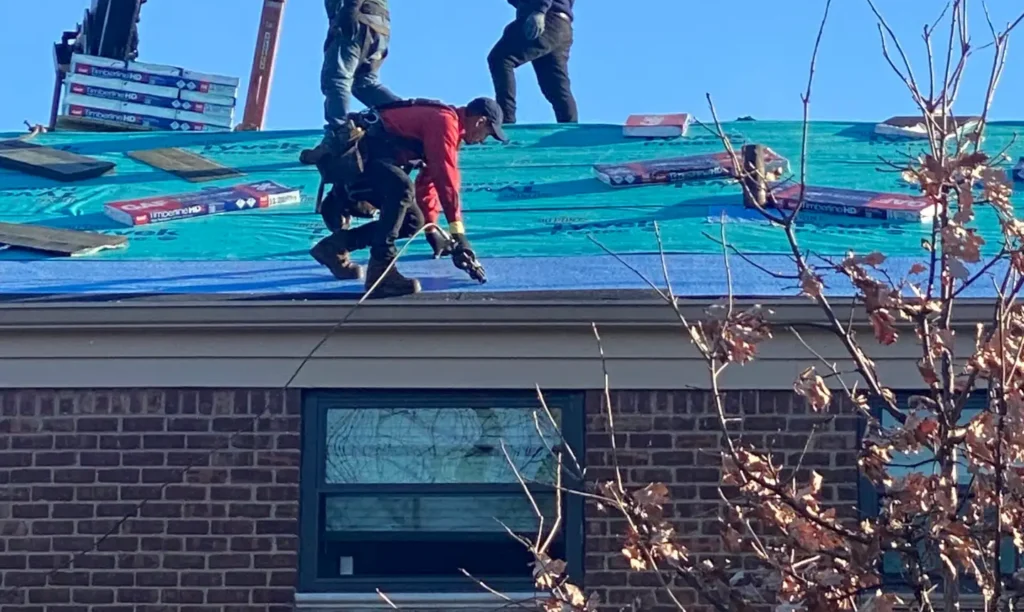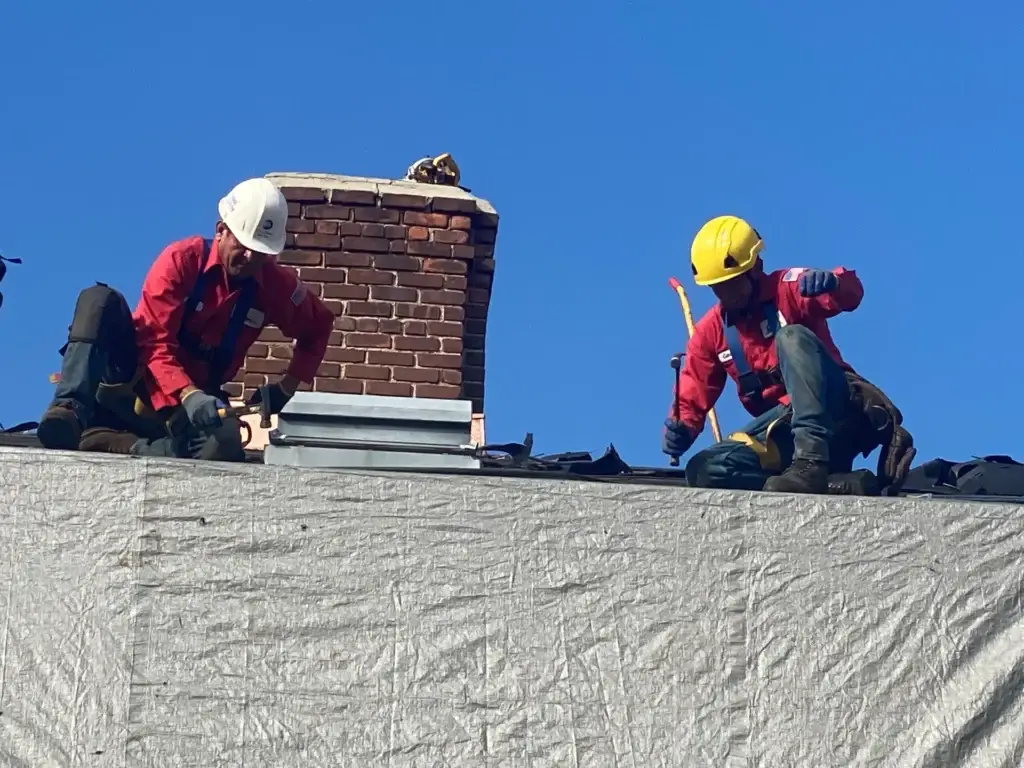What Long Island Homeowners Need to Know About Roofer's Insurance
Over 35 Years as a Roofer in Long Island
Does Your Roofer
Have the Proper Insurance Coverage?
When they hire a roofing contractor, many Long Island homeowners never stop to ask about their roofer’s insurance coverage. But that can be a very costly mistake. Roofer’s insurance ensures that if accidents or damages occur during the project, you won’t be held financially responsible. If your roofer doesn’t have proper insurance, you could face unexpected expenses that strain your budget and prolong your roofing project.
Choosing a contractor with comprehensive roofer’s insurance helps you avoid liability for worker injuries and property damage. Proper roofer’s insurance gives you peace of mind, because you know that your contractor can cover potential mishaps. Confirming your roofing contractor’s insurance coverage prevents costly surprises and ensures your roofing job goes smoothly.
To help you make an informed decision about your roofing project, here are some insurance facts that you need to know before signing any contracts.
Why Roofer's Insurance
Matters to Long Island Homeowners

Roofer’s insurance protects your financial investment and ensures a safer project. If a contractor lacks proper coverage, you could be held responsible for damages or injuries that happen on your property. Proper insurance coverage helps you avoid unexpected costs that could impact your budget and derail your project’s timeline.
Roofing involves high-risk work, and accidents can happen even when your contractor follows all recommended safety practices. Roofer’s insurance covers potential injuries to workers and third-party damages, saving you from legal or medical expenses. Verifying insurance coverage before hiring prevents costly surprises and secures your investment.
Protecting Your Financial Investment
Roof work comes with inherent risks, including accidental property damage and worker injuries. If your roofing contractor lacks proper insurance, you may bear the financial burden of these unforeseen issues. Ensuring your contractor carries comprehensive insurance minimizes your risk and keeps your investment safe.
Without roofer’s insurance, even minor accidents can become costly. Damage to your home or neighboring properties could lead to expensive repairs or legal disputes. Confirming your contractor’s insurance coverage helps you avoid these potential financial pitfalls and ensures your project stays on track.
Ensuring Liability Coverage for Accidents
Ensuring liability coverage for accidents is vital when hiring a roofing contractor. A contractor with proper roofer’s insurance ensures that any accidents causing damage will be covered without impacting your finances. This coverage safeguards you against unexpected costs and protects your investment throughout the project.
Accidents can also extend beyond property damage. A roofer’s liability insurance should cover third-party injuries that may occur during the job. If a visitor or passerby gets injured on your property, liability coverage ensures the contractor handles related medical expenses or legal claims.
Understanding the Scope of Insurance Policies
Not all insurance policies cover the same risks. Many “home improvement” contractors don’t have the correct coverage required for roofing work. Because roofing work is considered high-risk, roofing coverage is more expensive than coverage for painting or interior work. Ensure your roofer’s insurance includes comprehensive coverage for potential property damage, third-party injuries, and worker-related incidents.
Reviewing the details of a contractor’s roofer’s insurance policy can highlight specific inclusions and exclusions. For instance, some policies may cover only limited types of damage or specific accident scenarios. Asking your contractor for proof of insurance and a clear explanation of the policy’s coverage prevents misunderstandings and keeps your project safe from financial surprises.
Key Insurance Coverage
Long Island Roofers Must Carry

Every reputable contractor should carry roofer’s liability insurance and worker’s compensation policies. These core coverages help safeguard homeowners from unexpected costs, injuries, and potential legal issues that may arise during roofing projects.
Roofer’s liability insurance covers property damage and third-party injuries, ensuring homeowners aren’t financially responsible for incidents. Worker’s compensation policies protect homeowners if a roofer gets injured on the job. Additional policies, like commercial auto insurance and inland marine insurance, provide extra layers of coverage for vehicles and equipment. Homeowners should verify these coverages to ensure their projects are fully protected from unforeseen challenges.
Roofer’s Liability Insurance
Roofer’s liability insurance is a must-have for any Long Island contractor. This coverage protects homeowners if the roofer accidentally damages property during the job. Whether it’s structural damage or harm to neighboring properties, liability insurance ensures the contractor’s policy will make you whole. Otherwise, the costs will come out of the homeowner’s pocket.
This insurance also covers third-party injuries that may happen while work is underway. For example, if a visitor or neighbor gets hurt due to project-related activity, liability insurance covers medical expenses and related claims.
Coverage for Property Damage
This coverage ensures that any damage a contractor causes to your home or nearby structures gets covered. Accidents can happen, such as equipment falling and damaging a window or siding. Property damage coverage protects you from paying for this expensive damage out of pocket.
Without this type of coverage, homeowners may face unexpected costs that strain their budgets and delay project timelines. Confirming that your roofer has liability insurance with property damage coverage helps prevent financial surprises.
Coverage for Third-Party Injuries
Coverage for third-party injuries ensures that if a visitor, neighbor, or delivery person sustains an injury due to the roofing project, medical expenses and potential legal claims are handled by the contractor’s insurance. Without this coverage, homeowners could be held responsible for unexpected medical costs or legal fees.
Roofing projects often involve heavy equipment, tools, and debris, increasing the risk of accidental injuries. By confirming your contractor has third-party injury coverage, you can avoid liability for these incidents.
Worker's Compensation Policies
Worker’s compensation policies protect homeowners by covering workers’ medical expenses if they get injured on the job. Without it, a worker could potentially file a claim against you, leading to unexpected legal and financial issues.
Worker’s compensation also shows a contractor’s commitment to safety and professionalism. Homeowners should always confirm a contractor has this coverage before any work begins. Verifying worker’s compensation policies ensures you won’t face liability for worker injuries, allowing your project to proceed without complications.
Protecting Homeowners from Injury Claims
If a worker gets injured on your property, worker’s compensation covers medical expenses and lost wages. Without it, the injured worker could potentially file a claim against you, leading to costly legal battles and financial strain.
Worker’s compensation coverage shifts the liability from the homeowner to the contractor, protecting you from unexpected injury claims. This protection ensures that your roofing project doesn’t come with hidden risks or expenses. Always confirm that your contractor carries valid worker’s compensation policies to avoid potential issues and maintain peace of mind throughout the project.
Ensuring Worker Safety
Proper worker’s compensation policies highlight a contractor’s commitment to protecting their employees during potentially hazardous work. This coverage not only supports injured workers by covering medical expenses and lost wages but also demonstrates that the contractor follows safety standards.
For homeowners, confirming that a contractor prioritizes worker safety means fewer risks on your property. It ensures that safety protocols are in place and that workers are protected if accidents occur. Verifying your contractor’s commitment to ensuring worker safety helps your roofing project run smoothly, avoiding unnecessary delays and protecting everyone involved in the process.
Commercial Auto Insurance
Commercial auto insurance is important for roofing contractors because it covers vehicles and equipment used for projects. This coverage ensures that if an accident occurs involving the contractor’s vehicle on your property or during transportation, damages and liabilities are managed by the insurance. This protects homeowners from any potential claims if a work vehicle causes an accident.
For Long Island homeowners, knowing your contractor has commercial auto insurance means peace of mind. It ensures that trucks transporting materials, tools, and equipment are fully insured. If an incident damages your property or affects traffic nearby, the contractor’s insurance handles repairs and costs. Confirming your roofer’s commercial auto insurance coverage ensures a worry-free experience and keeps your project running smoothly without unexpected issues.
Inland Marine Insurance
Roofing projects rely on specialized tools and materials that can be costly to replace if lost, stolen, or damaged. For Long Island homeowners, this insurance ensures that any issues involving contractor equipment won’t delay the project or incur extra costs.
With inland marine insurance, homeowners have peace of mind knowing that their contractor is prepared for unexpected losses. If vital tools are damaged or stolen, the insurance covers their replacement and makes you whole. This coverage prevents project delays that could extend timelines and inconvenience homeowners.
The Importance of
Verifying Your Roofer’s
Insurance Coverage

Ensuring your contractor has valid insurance means any mishaps will be covered by their policies, not by you. Homeowners who skip this step could face unexpected expenses and legal challenges if accidents occur.
Checking your roofer’s insurance coverage ensures that the policies are current and comprehensive. This verification helps avoid gaps in coverage that could leave you liable for damages or injury claims. Ask for proof of insurance and confirm details with the provider for peace of mind. Taking the time to verify coverage before work begins safeguards your investment and allows your roofing project to proceed without stress.
Steps to Verify Insurance Credentials
- Ask for Proof of Insurance: Request a copy of the contractor’s insurance certificates, including liability insurance and worker’s compensation policies, before signing any contract.
- Check Policy Validity Dates: Ensure that the insurance coverage is active and extends throughout the entire project duration.
- Verify Insurance with the Provider: Contact the insurance company to confirm that the policies are valid and in good standing.
- Confirm Coverage Types: Check that the insurance includes liability, worker’s compensation, and other relevant policies like commercial auto and inland marine insurance.
- Review Policy Limits: Confirm that the coverage limits are sufficient to cover potential damages and injuries that could occur during the project.
- Ask for Additional Insured Status: Request that your property be added as an “additional insured” to the contractor’s policy for extra protection.
- Document All Details: Keep copies of the insurance certificates and any related communication for your records throughout the project.
Following these steps ensures that you are protected and that your roofer’s insurance coverage meets necessary standards for a worry-free project.
Common Red Flags to Watch For
- No Proof of Insurance Provided: Be cautious if a contractor hesitates or refuses to show proof of insurance.
- No Proof of Insurance Provided: Be cautious if a contractor hesitates or refuses to show proof of insurance.
- Expired Policies: Check policy dates and avoid contractors with expired or near-expiration insurance coverage.
- Low Coverage Limits: Ensure the policy limits are adequate to cover potential damages and injuries during the project.
- Unresponsive Insurance Providers: Verify the policy directly with the insurance company. Avoid contractors whose insurance providers are unresponsive or untraceable.
- Incomplete Coverage: Confirm the policy includes all necessary coverage, such as liability, worker’s compensation, and relevant additional policies.
- No “Additional Insured” Option: Be cautious if a contractor can’t or won’t add your property as an “additional insured.”
- Unprofessional Certificates: Look for official, detailed insurance certificates, not photocopies or handwritten notes.
- Unwilling to Discuss Insurance Details: Contractors who avoid discussing insurance or become defensive should be a red flag.
Spotting these red flags helps homeowners choose reliable contractors with solid roofer’s insurance, ensuring peace of mind throughout the project.
Asking the Right Questions Before Signing a Contract
Asking the right questions before signing a contract ensures your roofing contractor has proper insurance coverage. Start by asking, “Can you provide proof of your current insurance policies?” This question confirms the contractor’s readiness to share essential details and proves their transparency. Verify that the insurance includes liability insurance, worker’s compensation, and other relevant policies like commercial auto insurance.
Dig deeper by asking, “What are the policy limits, and do they cover potential damages or injuries?” Ensure the policy limits align with potential risks. Finally, ask, “Can you add my property as an additional insured?” This step provides an extra layer of protection in case of incidents. Confirming answers to these questions protects your finances and ensures your roofing project runs smoothly without hidden risks.
Watch Out For Subcontractors!
Insurance coverage can become more complicated if your roofing contractor hires a subcontractor. Subcontractors may not have the same level of roofer’s insurance as the main contractor. If they are underinsured or lack worker’s compensation, homeowners could face liability for injuries or damages involving the subcontractor’s team. Always confirm that your primary contractor verifies the insurance status of any subcontractors they hire.
For the best protection, hire County Roofing Systems. We never use subcontractors on any of our jobs, and we’re happy to provide you with our insurance policies. You never have to worry about being left holding the bag for worker injuries or property damage.

The Risks of Hiring
an Uninsured or Underinsured
Roofing Contractor
The risk of hiring an uninsured or underinsured roofing contractor can be significant for homeowners. If a contractor lacks adequate insurance, you could be responsible for any damage or injuries that happen during the project. This liability can lead to unexpected expenses, medical bills, or even legal fees, adding unnecessary stress and expenses.
Hiring a contractor without sufficient insurance also puts your property and finances at risk. Accidents or damages can delay your project and increase costs, impacting your budget and timeline. Verifying insurance coverage before hiring ensures you avoid these potential issues. Always choose a contractor with comprehensive roofer’s insurance to protect your investment and maintain peace of mind throughout the roofing process.
Financial Liability for Homeowners
If a worker gets injured or property damage occurs, you could be held financially responsible. These costs can include medical expenses, property repairs, or even legal fees, creating unexpected financial strain.
Without proper roofer’s insurance, homeowners may face thousands of dollars in expenses if an incident happens. Verifying that your contractor carries liability and worker’s compensation insurance protects you from these risks. Ensuring proper insurance coverage before a project starts is essential for safeguarding your finances and preventing potential legal issues. Always confirm your contractor’s policies to keep your investment safe and your peace of mind intact.
Project Delays and Potential Legal Issues
Project delays and potential legal issues often arise when hiring an uninsured or underinsured roofing contractor. Without the proper insurance, accidents or damages can halt progress, extending timelines and creating costly delays. These disruptions can lead to unfinished work or extended periods of inconvenience for homeowners.
Legal issues also become a major risk if a worker or third party sustains an injury during the project. If your contractor lacks adequate roofer’s insurance, you could be entangled in legal battles, facing court costs and potential settlements. Choosing a fully insured contractor helps you avoid project interruptions and legal complications, ensuring a smooth and protected roofing experience.
Impact on Home Insurance Policies
If an accident occurs and your roofer lacks adequate insurance, you may need to file a claim through your own home insurance policy. This can lead to increased premiums or, in worst cases, policy non-renewal.
Using your home insurance to cover damages or injuries can have long-term financial impacts. Insurers may view multiple claims as a risk factor, which could affect your future coverage options. Verifying that your contractor has comprehensive roofer’s insurance minimizes this risk, ensuring that your policy remains intact and unaffected.
County Roofing is
Your Trusted Long Island Roofer

County Roofing Systems has built a solid reputation as Long Island’s trusted roofing contractor due to its dedication to quality, professionalism, and complete customer satisfaction. One of the key reasons homeowners choose County Roofing Systems is their commitment to comprehensive insurance coverage. Unlike many competitors, County Roofing ensures full protection for both clients and their own team. This dedication to safety and responsibility allows homeowners to feel confident that any project is protected from unexpected issues.
Being fully insured means County Roofing carries extensive roofer’s liability insurance and worker’s compensation policies. These coverages safeguard homeowners from financial liability if accidents or damages occur during the project. Clients are protected from potential medical expenses or repair costs that could arise if an incident happens on-site.
Homeowners also trust County Roofing Systems because they go beyond basic insurance requirements. The company maintains comprehensive policies that include commercial auto insurance and inland marine insurance for tools and equipment. This commitment to coverage means projects run smoothly, even if unforeseen events happen.
People Also Ask...
Roofer’s insurance includes policies that cover property damage, injuries, and other potential issues during a roofing project. It protects homeowners from unexpected expenses and liabilities.
A reliable roofing contractor should have liability insurance, worker’s compensation, commercial auto insurance, and inland marine insurance for full protection during projects.
Roofer’s insurance ensures that if an accident or property damage occurs, the contractor's insurance covers costs, preventing homeowners from facing unexpected financial liabilities.
If a contractor lacks worker’s compensation insurance, a worker injured on your property could file a claim against you, leading to potential legal and medical expenses.
Yes, always ask for proof of insurance and verify it with the insurance provider. This ensures the contractor’s policies are current and valid.
Yes, if you need to file a claim through your home insurance due to contractor negligence, your premiums may increase, or your policy could face non-renewal.
Red flags include expired policies, incomplete coverage, refusal to provide proof of insurance, and low policy limits that won’t cover potential damages or injuries.
Adding your property as an “additional insured” to the contractor’s policy gives you extra protection in case of accidents or claims related to the project.
Check that the insurance covers liability, worker’s compensation, and equipment, and confirm policy limits are high enough to cover potential damages or injuries.
In over 3 decades of contracting work on Long Island, we’ve worked with many local lenders. Give us a call and we can give your home more space, curb appeal, and property value.

